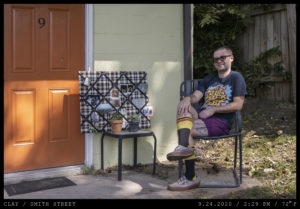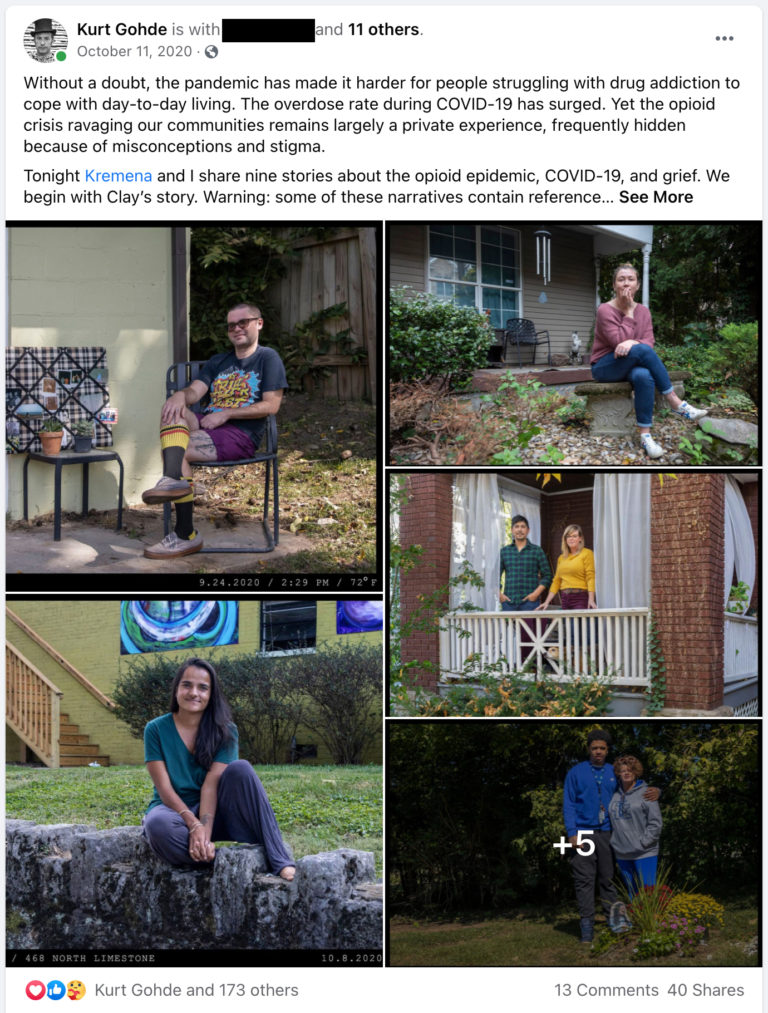Without a doubt, the pandemic has made it harder for people struggling with drug addiction to cope with day-to-day living. The overdose rate during COVID-19 has surged. Yet the opioid crisis ravaging our communities remains largely a private experience, frequently hidden because of misconceptions and stigma.
Tonight Kremena and I share nine stories about the opioid epidemic, COVID-19, and grief. We begin with Clay’s story. Warning: some of these narratives contain references to self-harm, death, and suicide.
Clay: “I have been expecting a phone call from my hometown since quarantine began. Even if the pandemic wasn’t surging through the United States and elsewhere, I’d be expecting the call, because it’s been over a year since my community has lost another dear friend to a drug overdose. These things cannot be predicted, but my fellow survivors and I have run the lines of the script so many times that patterns and cycles have emerged. Add to that the pandemic. We’re all more vulnerable now, but people who use opioids and other intravenous drugs are especially so due to isolation and diminished communication about what batches of drugs are bad.
As I write today, it’s been a year, four months, and eighteen days since we lost Dan. If I’m remembering correctly (it’s difficult), since my loved ones started dying, the only longer interim was between the third Corey and Mia. Before the day after Valentine’s Day 2015, when I got the call about Mia, I was stupid enough to think that the cycle was going to stop, or at least slow. It hasn’t.
Frankly, I’m stupefied that I haven’t gotten a call during COVID and I fear I may receive several in quick succession if a particularly bad batch hits the streets.
Years ago, after one of my friends died—I can’t remember which one—my sister comforted me over the phone. She told me I was getting old enough now that I’d stop losing people my age and younger to overdoses and drug-related suicides. That’s what happened for her. At some point, she stopped getting the calls. She’s about five and a half years older than me. I honestly don’t know if that age gap is the key difference in our experiences or if she simply doesn’t keep in touch with as many people from home as I do. I am thirty-one years old, right in the sweet spot of the first generation fundamentally affected by the opioid crisis. The term opioid crisis wasn’t even in common usage when I started writing about my lost ones and adorning my skin with memorials.
I currently have eight tattoos. Four of them are connected to loss. I have plans and space for many more. The first one I ever got was part of the Lexington Tattoo Project. I chose the phrase ‘The Recalled Part,’ because I loved the dual meaning of something remembered and something taken back due to defect. I love memory and I love defects. One thing that’s important to remember about defects is that the flaw is in the eye of the beholder. My friends struggled, but they weren’t defective to me. And they certainly didn’t deserve to be recalled, taken from this life before they could become.
I recall my friends because they deserve to be remembered, held. Many people who haven’t loved someone fighting addiction will think that an overdose is a clear indicator of a flawed character, that that person somehow deserved their fate due to negligence or immorality or something unspeakably depraved. My friends were flawed as much as anyone, true. But, deep down, they were not so different from anyone else. They were good people trying their best. They loved and were loved, deeply. They gave great hugs.
I give great hugs. Ask anyone I care about. I’d prove it to you, but we’re in a pandemic. Trust me though, my hugs are famous amongst the initiated. My friends talk to me and amongst themselves about ‘Clay Hugs.’ I’ve been experiencing anxiety for years, but it has crippled me during COVID, and I’m convinced that that’s at least partially because I can’t hug people.
I also live with depression. We’re old pals compared to my relationship with anxiety. It’s impossible to pinpoint when the depression came, but it was very close to when I first started losing friends. Maybe it started around the first Corey, someone I met at daycare and played junior sports with and had sleepovers with and, later, when we reconnected in high school, drank shitty whisky with around bonfires at the field parties we threw.
I’m from Ashland, KY. We have our own language, a patois honed through frequent, recurrent, collective grief. Almost all of my Ashland friends have had to make the calls I’ve alluded to. We know how to comfort each other as best we can. For example, when I tell someone I’m sorry they’ve lost someone and they respond, ‘It’s okay,’ I always stop them and say, ‘No. It’s not. But it’s okay that it’s not okay.’
Another part of our language is dark, macabre humor. Chalk it up to the old formula of tragedy plus time equals comedy. The Ashland and Huntington, WV metro is unquestionably one of the epicenters of the opioid crisis, if not the epicenter. Some of my friends and I often joke, ‘Now, it’s not a contest, but if it was…we won.’
When another person close to me dies, my friends from elsewhere often apologize that I’m going through it again, that I’ve lost so many already. They’re there for me and they’re kind, but they don’t understand. If and when they do lose someone, they call me because they know I’m an unofficial expert on dead friends.
I wouldn’t call myself an expert, but I desperately want to understand. Last year, my Christmas wish list included three books about the opioid crisis. I would have asked for more, but I didn’t want to be greedy. I can tell you that the first person to overdose from intravenous drugs was the wife of the man who invented the hypodermic needle. I can tell you that the Sackler family, owners and founders of Purdue Pharma, promoted OxyContin in a truly unprecedented (read: immoral, unethical) fashion that completely changed the connection between pharmaceuticals and advertising in the United States; the drug was: 1) presented as a miracle medicine with practically no chance of patients forming chemical dependence, 2) given as free samples to patients a la heroin dealers giving the first hit for free, and 3) incentivized to be prescribed by physicians.
I can tell you that Kentucky was one of the first states to introduce a Prescription Monitoring Program, or PMP, and that when I first heard about their enhanced system, Kentucky All Schedule Prescription Electronic Reporting (KASPER), the first words out of my mouth were: ‘People are going to die.’ I knew, instinctively, that if synthetic opioids like OxyContin and Percocet were made more difficult to acquire, people would turn to heroin. And they did, en masse. KASPER curbed black market synthetic opioids and pharmacy shopping, but at least two heads sprung forth after slicing off the one: heroin and fentanyl. I can tell you that police and medical forces in Ashland and Huntington had to undergo special training when carfentanil hit the streets, a substance so potent you can overdose simply by touching it with bare skin. I can tell you that, oftentimes, when a batch of smack is known to cause overdoses, many users think ‘I gotta get me some of that.’
I can tell you I’ve had many, sometimes frustrating, conversations with people (including folx from my hometown), about taxpayer money going to reviving people suffering from overdose using Naloxone, Narcan, and other life-saving drugs. I can tell you, with pride, that I think this life saving is always worth my money.
I can tell you that, in Kentucky at least, Naloxone and Narcan are available as a ‘good samaritan’ prescription and that I currently have some in my cabinet if it’s ever needed and that I recommend everyone does the same. I can tell you that if more potent substances than heroin are involved, sometimes multiple doses of these life-saving drugs are necessary, and I still find those taxpayer dollars more than worth it.
I can tell you that, when I visited New York City about two years ago, while I was at a bar with an old friend and her then boyfriend, he and I spoke about Trump’s election and Kentucky voting for our current president. I can tell you that this man I’d just met days before, who has lived in large, liberal cities on the coasts his entire life, scoffed at our commonwealth for ‘voting against their own interests.’ I can tell you that I attempted to be civil and explain systematic poverty, etc. I can tell you that, when coal mining and the false promises of Trump supporting the coal industry came up, I tried to explain that a lot of Kentuckians voted on a single, legitimate issue: their livelihood. I can tell you that I said, ‘It’s one of the few jobs in that region that allows someone to support a family. What do you expect them to do? Work at Wal-Mart and provide for a family of five?’ I can tell you that my civility came to an abrupt halt when he used the word ‘junkie’ in my presence. I can tell you that I responded, with cornbread commie rage: ‘You don’t get to use that word. I don’t even like using that word, but if anything, that is our word, and I better not hear it come out your mouth again.’ I can tell you that when he went to the bathroom, I asked my friend if I was too harsh. She said no. I said, ‘Good, then I’m not going to apologize for putting him in his place.’
I can tell you that some people, including my mother, legitimately need pain relief and can’t get the medicine required because physicians are now so terrified of malpractice suits that they typically won’t prescribe opioids of any kind.
I can tell you, with complete confidence, that if I went to Huntington right now, despite the pandemic and having no connections to black market opioids, I could have heroin in my hand within the hour. I can tell you that I wouldn’t know for certain if it was cut with fentanyl or worse. I can tell you that even if it was my first time shooting up, I might die because the drugs I put in my body were not regulated or monitored.
I can also tell you that the intermittent suicidal thoughts I’ve had most recently have centered around getting heroin and putting a lot, and I mean a lot, of it in my arm. I can also tell you that I’m not going to do it. I can tell you I know my depression and anxiety are trying to kill me and that I’m going to fight. I can tell you, no matter how scared I am, I’m going to win.
I can tell you I’m never going to do opioids again. Yes, again. Because I have snorted OxyContin, Percocet, Dilaudid, and Lortab. I’ve also smoked opium and drank Codeine. Three of the people I actually did these drugs with are dead. Two of them offered to teach me how to shoot up. I was in the room and said ‘Maybe next time.’ I watched Travis cook down the pills and cinch Gary’s arm. Gary wanted Travis to teach him. He was sitting on my bed. After the needle left his body, Gary closed his eyes, went tranquil, and leaned far back. One of his legs rose off the ground and became parallel with his torso. In the moment, I assumed the drugs made it feel especially good to stretch out his leg. When Gary came down, he told me he intentionally raised his leg as a counterbalance so he wouldn’t fall all the way back on to my bed because he didn’t want to upset me. Gary shot up for the first time, supposedly one of the most euphoric, all-consuming experiences anyone can ever have, and he was thinking about how his actions might make me feel. He was one of the kindest, sweetest men I’ve ever met. Then he hanged himself.
Travis and I went to the funeral and spoke at it together. Afterward, we went back to his hotel room for pizza and beer. When his fiancée ran an errand, leaving Travis and me alone, he asked me if I wanted to do some Oxy with him. That was the first time I outright refused, the beginning of my shift away from hard drugs. I never had a serious problem with any opioids, but the pleasure was gone. I was angry, but I didn’t storm out, because I loved Travis and rarely got to see him after he joined the military as part of a plea deal for drug charges. I stayed with him and my other friends because I needed that connection at the time, even if I was the only one that knew Travis was high. Shortly after, he was found in his car, abandoned by some so-called friends after he experienced a speedball overdose of meth and heroin.
I can tell you that every time I visit Ashland, I stop at the Veterans Cemetery off the highway on my way into town and talk to Travis.
For this project, I chose to be photographed with the picture board my partner made me. Six of the pictures currently on the board feature dead friends, including Travis, Gary, and Josh. A lot of my friends shut down temporarily after a death and don’t want to see pictures. I’ve been there. I understand. But the older I get and the more people I lose, the more I inundate myself with pictures and stories about my most recently lost, as if hoping to speed the grieving process.
One year, four months, and eighteen days. Maybe my sister is right this time. But I doubt it. I’ll still be expecting the next call, and the one after that, and so on. One year, four months, and eighteen days since we lost Dan, King of the Group Photo. Without fail, when I got together with Dan and other friends, we took a picture together, always at Dan’s insistence. I hate having my picture taken. But I love the pictures I have of Dan and me and others we love.
Everyone is currently reevaluating what they want and need most because of the pandemic. The method of COVID’s forced re-prioritization is painful, but effective. When this alternate life dissipates and things ‘go back to normal,’ I, for one, am going to take a hell of a lot more group photos. Oh, and the hugs. There will be so many hugs. Watch out. You’ve been warned.”
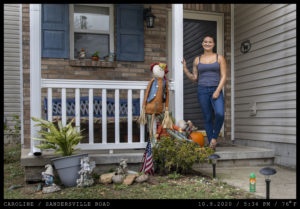
Caroline
Caroline: “My name is Caroline and I suffer from anxiety and severe
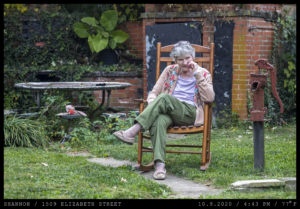
Shannon
“I have the gift of perspective, endowed simply by my time spent

Riley
Riley: “four years ago this week, my twin brother overdosed in the

Ryan and Jennifer with Blue
Jennifer: Blue Valentine It was a divine intervention. That’s the only way
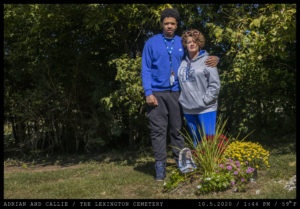
Adrian and Callie
Callie: “My older son Averi struggled with depression because of a bone
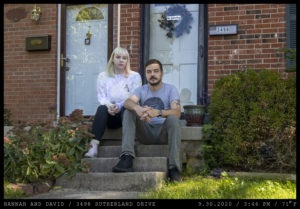
Hannah and David
Hannah: “When I first took a Percocet, I was mostly ignorant about
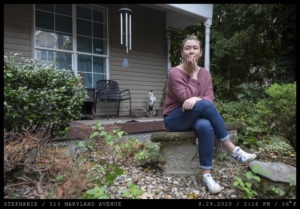
Stephanie
Stephanie: “Mia wasn’t the first person I knew who died from drug-related

Jeane Anne
Jean Anne: “I am from Ashland, Kentucky. It borders West Virginia. I
